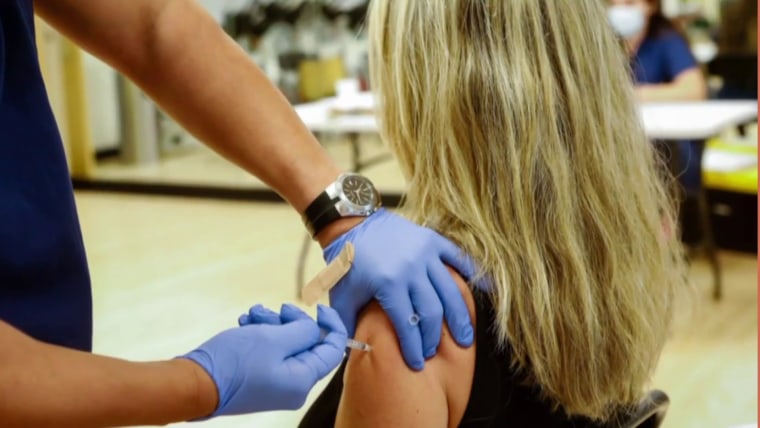Ivermectin myths make Covid vaccine and test PSAs a harder sell
The rise of the ivermectin cult is one of the most nonsensical storylines — in a sea of nonsensical storylines — to emerge during the pandemic. Even now, as Covid begins to become a less dominant force in our lives, the ivermectin bunkum continues.
There have been several recent large, well-done, clinical trials, including one published in the New England Journal of Medicine on Wednesday, that definitively show, according to one of the study’s authors, “there’s really no sign of any benefit.”
But this growing body of it-doesn’t-work evidence hasn’t stopped ivermectin champions from championing.
But this growing body of it-doesn’t-work evidence hasn’t stopped ivermectin champions from championing. “RETRACT PAPER @NEJM NOW!!!!!” an anti-vaccine physician posted on Twitter a few days after the study was published. In her view it is a “CRIMINAL PAPER” that is “PROMOTING MURDER.” (All caps and exclamation marks in original, of course.)
The ivermectin stories have gotten so bizarre that I increasingly need to double-check to see whether they are satire. People are advocating giving it to babies, patients are sneaking it into hospitals inside teddy bears, and a candidate in Wisconsin’s attorney general election wants to investigate potential homicides in hospitals because “loved ones were basically being murdered” because ivermectin is being “withheld from them.”
Reality: There has never been good clinical evidence to support the use of the drug in the context of Covid. In the pandemic’s early days there were laboratory studies — that is, research done in petri dishes and not involving actual humans — that suggested the drug, which is used to treat parasites in horses, had antiviral properties. (This kind of work rarely translates into clinical application.) There were also some observational studies that seemed promising.
But as soon as data from more rigorous and comprehensive studies started to come in, it became clear that ivermectin was not a magical cure. In July, for example, a systematic review by the highly respected and independent Cochrane Collaboration — an international academic organization that does evidence reviews to inform clinical practice — concluded that there was no good evidence to support the use of the drug to treat or prevent Covid.
Unfortunately, a large part of the ivermectin “debate” has been severely polluted by fraudulent and poorly done studies. Many of the papers that suggested a possible benefit have been retracted or found to be fundamentally flawed. But the damage has been done. These studies live on as unkillable Zombie Papers that feed the “ivermectin works!” mythology.
And why do they live on? Because ivermectin very quickly became not about science but about ideology and in-group signaling. It was pushed by a variety of right-wing voices, Covid contrarians, QAnon backers and, even, state actors, such as China and Russia, to promote information chaos in support of many agendas, both personal (e.g., profiting from the sale of ivermectin) and ideological (e.g., fostering distrust in national political and public health institutions).
Indeed, the degree to which ivermectin discourse and decision-making are tied to ideology, as opposed to science, borders on the absurd. A study by the University of Pennsylvania’s Annenberg Public Policy Center, for example, found that 75 percent of people who get their news from very conservative news sources would recommend ivermectin to someone exposed to Covid. Only 35 percent of those who get their news from the legacy media would do the same.
A poll last year by YouGov found that most Republicans who have heard about ivermectin “believe it could be effective, despite FDA warnings about its danger.” And a study this year found that as a result of the misinformation and hype, ivermectin prescribing volume rose by an astounding 964 percent in 2020. Such prescribing was significantly higher in counties that voted Republican. The higher the Republican vote, the higher the ivermectin use.
As I said, absurd.
Believing in ivermectin has become a badge of affiliation indicating a particular worldview. It also signals that a person is most likely exposed to — and may even believe — other common misinformation tropes embraced by that community, for example, the belief that the number of Covid deaths has been exaggerated (in fact, it is likely to have been underreported), that the vaccines killed thousands (in reality they saved hundreds of thousands of lives) and that the public health measures were unnecessary and ineffective (just wrong).
Want more articles like this? Follow THINK on Instagram to get updates on the week’s most important political analysis
Of course, the ivermectin myth also fits broader anti-vaccination narratives, such as those pushed by Dr. Peter McCullough, a physician well-known for his Covid conspiracies. In his notorious three-hour, bunk-filled appearance on Joe Rogan’s podcast in December, he claimed that the failure to use drug therapies like ivermectin resulted in “a giant loss of life — a giant number — millions and millions of unnecessary hospitalizations,” and that the withholding of the drug was “intentional, very comprehensive suppression of early treatment in order to promote fear, suffering, isolation, hospitalization and death.”
And as a reminder, not only is this kind of evidence-free ranting deeply aggravating and incomprehensibly irresponsible, but it also does great harm. A study published in the Journal of the American Medical Association, for example, found that U.S. health care insurers wasted almost $200 million in one year on ivermectin prescriptions for Covid. The researchers note that the “true amount of waste is even higher because estimates did not include Medicaid spending.” Last year the FDA issued a warning about a spike in ivermectin-related “significant adverse effects reported to U.S. poison control centers.”
But one of the biggest harms of this kind of misinformation is that it distracts from and creates uncertainty about proven approaches to treat and prevent Covid. Research has shown that people who believe this kind of misinformation are less likely to adopt preventive strategies, such as wearing masks, physical distancing and, of course, getting Covid vaccinations. How many people died because they decided not to get vaccinated based on a belief, constantly reinforced by loud voices within their ideological community, that an anti-parasite drug would be there to save them?
The ivermectin believers never really address the conceptual inconsistency of why it makes sense to advocate for an unproven pharmaceutical treatment with known side effects over a vaccine that has a mountain of evidence demonstrating efficacy and safety. Again, I think ideology plays a role. A vaccine that is given free by the government for the benefit of the entire community smells like socialism, I guess. While taking an unproven therapy is something individuals do for themselves. Freedom!
Related:



